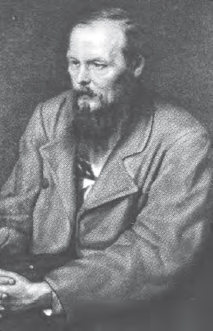Continental PhilosophyFyodor Dostoyevsky |
What aspects of Dostoevsky’s life influenced his deep interest in human difficulty? |
Dostoyevsky’s father was a violent and abusive alcoholic. He was also the doctor of the Mariinsky Hospital for the Poor in Moscow. Dostoyevsky himself suffered from epilepsy from the age of nine. As a child, he used to disobey his parents and explore Mariinsky Hospital, absorbed by the misery of the patients and the stories about their lives that they told him. His first book, Poor Folk (1846), brought out the individual humanity of the poor, who were otherwise be ignored and dismissed by the educated reading public of the time.
In 1849 Dostoyevsky was arrested for his participation in the liberal group of intellectuals called the Petrashevsky Circle. He was sentenced to death, although Czar Nicholas II did not really intend for the execution to be carried out. Nevertheless, the experience of standing for hours in the freezing cold in anticipation of a firing squad was believed to have scared Dostoyevsky for life. He was then exiled to Siberia for four years of hard labor. He wrote of this period: “In summer, intolerable closeness; in winter, unendurable cold. All the floors were rotten. Filth on the floors an inch thick; one could slip and fall…. We were packed like herrings in a barrel…. Fleas, lice, and black beetles by the bushel.”
When Dostoyevsky’s brother and wife died in the same year, he fell into a deep depression and became a gambler. During that period he wrote Crime and Punishment (1866), in a frenzied haste, because he was out of money. His life evened out after 1867, when he married his 20-year-old stenographer to whom he had dictated The Gambler (1867). While this book is about an elderly woman who gambles self-destructively, some think that Dostoyevsky was describing his own compulsion.
Dostoyevsky lived at the Russian resort Staraya for years before his death from emphysema and an epileptic seizure that brought on a lung hemorrhage. Forty thousand people went to his funeral.

